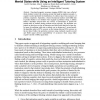Free Online Productivity Tools
i2Speak
i2Symbol
i2OCR
iTex2Img
iWeb2Print
iWeb2Shot
i2Type
iPdf2Split
iPdf2Merge
i2Bopomofo
i2Arabic
i2Style
i2Image
i2PDF
iLatex2Rtf
Sci2ools
EDM
2010
2010
Using Neural Imaging and Cognitive Modeling to Infer Mental States while Using an Intelligent Tutoring System
Functional magnetic resonance imaging (fMRI) data were collected while students worked with a tutoring system that taught an algebra isomorph. A cognitive model predicted the distribution of solution times from measures of problem complexity. Separately, a linear discriminant analysis used fMRI data to predict whether or not students were engaged in problem solving. A hidden Markov algorithm merged these two sources of information to predict the mental states of students during problem-solving episodes. The algorithm was trained on data from one day of interaction and tested with data from a later day. In terms of predicting what state a student was in during any 2 second period, the algorithm achieved 87% accuracy on the training data and 83% accuracy on the test data. Further, the prediction accuracy using combined cognitive model and fMRI signal showed superadditivity of accuracies when using either cognitive model or fMRI signal alone.
Cognitive Model | Data Mining | EDM 2010 | Fmri Data | FMRI Signal |
| Added | 29 Oct 2010 |
| Updated | 29 Oct 2010 |
| Type | Conference |
| Year | 2010 |
| Where | EDM |
| Authors | Jon M. Fincham, John R. Anderson, Shawn Betts, Jennifer Ferris |
Comments (0)

